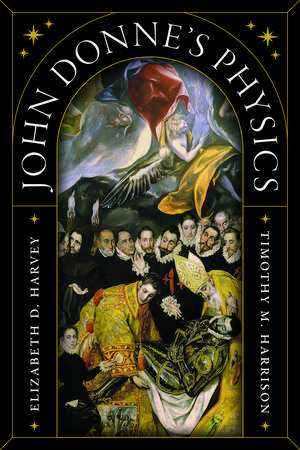John Donne's Physics
Autor Professor Elizabeth D. Harvey, Professor Timothy M. Harrisonen Limba Engleză Paperback – 10 mai 2024
In 1624, poet and preacher John Donne published Devotions upon Emergent Occasions, a book that recorded his near-death experience during a deadly epidemic in London. Four hundred years later, in the aftermath of our own pandemic, Harvey and Harrison show how Devotions crystalizes the power, beauty, and enduring strangeness of Donne’s thinking. Arguing that Donne saw human life in light of emergent ideas in the study of nature (physics) and the study of the body (physick), John Donne’s Physics reveals Devotions as a culminating achievement, a radically new literary form that uses poetic techniques to depict Donne’s encounter with death in a world transformed by new discoveries and knowledge systems.
| Toate formatele și edițiile | Preț | Express |
|---|---|---|
| Paperback (1) | 184.74 lei 3-5 săpt. | +14.11 lei 6-12 zile |
| University of Chicago Press – 10 mai 2024 | 184.74 lei 3-5 săpt. | +14.11 lei 6-12 zile |
| Hardback (1) | 582.25 lei 6-8 săpt. | |
| University of Chicago Press – 10 mai 2024 | 582.25 lei 6-8 săpt. |
Preț: 184.74 lei
Nou
Puncte Express: 277
Preț estimativ în valută:
35.35€ • 36.53$ • 29.41£
35.35€ • 36.53$ • 29.41£
Carte disponibilă
Livrare economică 27 februarie-13 martie
Livrare express 12-18 februarie pentru 24.10 lei
Preluare comenzi: 021 569.72.76
Specificații
ISBN-13: 9780226833514
ISBN-10: 0226833518
Pagini: 256
Ilustrații: 6 halftones
Dimensiuni: 152 x 229 x 20 mm
Greutate: 0.37 kg
Ediția:First Edition
Editura: University of Chicago Press
Colecția University of Chicago Press
ISBN-10: 0226833518
Pagini: 256
Ilustrații: 6 halftones
Dimensiuni: 152 x 229 x 20 mm
Greutate: 0.37 kg
Ediția:First Edition
Editura: University of Chicago Press
Colecția University of Chicago Press
Notă biografică
Elizabeth D. Harvey is professor emeritus of English at the University of Toronto, a literary critic, and a psychoanalyst. She is the author or editor of several books, most recently Luce Irigaray and Premodern Culture: Thresholds of History. Timothy M. Harrison is associate professor in the Department of English Language and Literature and the John U. Nef Committee on Social Thought at the University of Chicago. He is the author of Coming To: Consciousness and Natality in Early Modern England, also published by the University of Chicago Press.
Cuprins
List of Figures
Abbreviations
Preface
Introduction: Threshold Physics
1. Donne’s Experience
2. The Time of the Body
3. Changing Genres
4. The History of Words
5. The Physician Calls
6. Translating the Soul
Coda
Acknowledgments
Bibliography
Index
Abbreviations
Preface
Introduction: Threshold Physics
1. Donne’s Experience
2. The Time of the Body
3. Changing Genres
4. The History of Words
5. The Physician Calls
6. Translating the Soul
Coda
Acknowledgments
Bibliography
Index
Recenzii
"A phenomenal critical edition of Donne’s Devotions. It is particularly joyful to see Harvey and Harrison piece together an understanding of how genre and structure, metaphors and language fit the general concepts and ideas that Donne dealt with. Their work cements the idea of how Early Modern texts can be seen as a laboratory for exploring what it is like to be human and be aware of one’s mortality."
"Compelling. . . there is much to admire in this book."
“‘I would not,’ John Donne wrote, ‘that death take me asleep.’ It did not. John Donne’s Physics is a magnificent account of those waking moments of dying. It is so much more than biography. If we are ourselves part of the natural order, then a rigorous first-personal account of embodied decay has a claim to count as a contribution to physics. This book is a delightful account of Donne’s transformation of the very idea of experience.”
“Like its mind-bending subject, John Donne’s Physics travels deep into the microcosm and out to the very edges of thought. Combining great erudition with exquisite attention to linguistic detail, Harvey and Harrison show us how Donne’s intimate experiment in the phenomenology of illness speaks to us with passion and urgency across four centuries.”
“John Donne’s Physics is a remarkable book. In their engaging way, the authors resituate Donne’s Devotions upon Emergent Occasions, his exploration of what they call ‘the extended domain of dying,’ at the center of his corpus, where philosophical, physical, medical, and other kinds of knowledge converge. I learned a great deal and will absorb Harvey and Harrison’s insights into my own research and teaching.”
